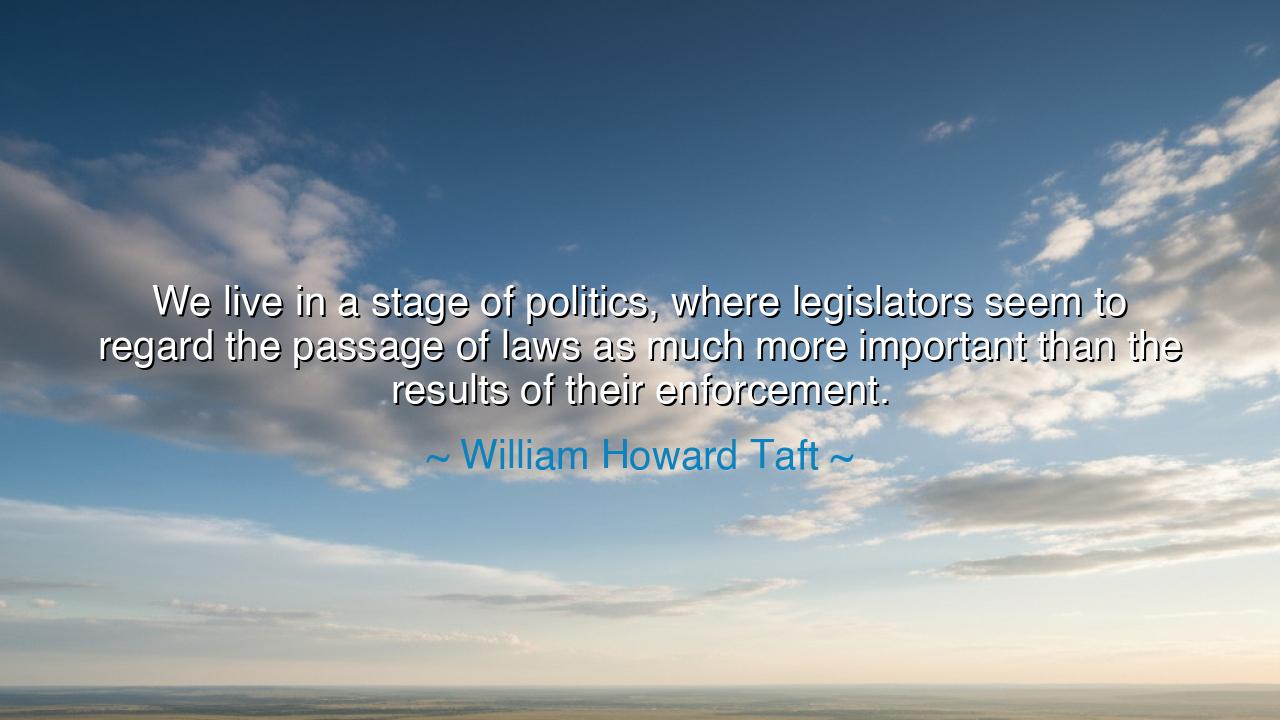
We live in a stage of politics, where legislators seem to regard
We live in a stage of politics, where legislators seem to regard the passage of laws as much more important than the results of their enforcement.






Hear, O seekers of justice, the words of William Howard Taft, who once held the highest offices of the American Republic: “We live in a stage of politics, where legislators seem to regard the passage of laws as much more important than the results of their enforcement.” In this utterance lies a warning against vanity in governance, where leaders value the appearance of action more than the substance of justice. For what use are statutes written in gold if they remain unheeded in the lives of the people?
For Taft, himself both President and Chief Justice, knew the burden of law. To him, laws were not ornaments, nor trophies to be paraded, but instruments meant to shape society and protect the citizen. Yet he saw that many lawmakers pursued only the passage of laws, as if victory ended with the stroke of a pen. They mistook the symbol for the reality, forgetting that the true test of law lies in its enforcement, in whether it brings relief, order, and fairness to the land.
History bears witness to this danger. Consider the noble Prohibition Amendment in America, meant to curb vice and preserve moral order. The law was passed with great fanfare, yet its enforcement was frail and riddled with corruption. Instead of virtue, it bred organized crime and defiance. The lesson was clear: to make law without ensuring its just enforcement is to build castles upon sand.
So too in other lands and ages, when rulers proclaimed reforms that were never lived out in practice. The Roman Senate passed edicts to ease the plight of the poor, yet without faithful officials to enforce them, they became hollow promises. The people learned to distrust their leaders, for they saw laws announced with ceremony but never felt their benefits. This is the peril Taft spoke of: when law becomes theater, politics becomes deceit.
Therefore, let this wisdom endure: it is not the number of laws that measures a nation’s greatness, but their living impact upon the people. Enforcement is the breath that gives laws life; without it, they are corpses, fair to look upon but void of power. Taft’s words remain a warning to all generations—that legislators must not chase the glory of passing laws, but the harder, humbler task of making them real. For only then does politics fulfill its sacred duty to serve.






DDBach Duc Duong
This quote is a sharp critique of modern politics, highlighting how lawmakers sometimes seem more concerned with the symbolic act of passing laws than with the real-world impact. Why is it that legislation often becomes more about political posturing than about tangible results? What steps can we take to make politicians more accountable for ensuring that the laws they pass are properly enforced and lead to positive change?
TTDuong Thanh Tien
I think Taft’s quote touches on a very important issue in contemporary politics. It seems that many politicians focus on passing laws to create the illusion of progress, but fail to consider the practical aspects of enforcement. How do we ensure that laws are not just written for show, but actually implemented in a way that benefits society? Is there a way to make lawmakers more accountable for the outcomes of their legislation?
PHPhung Huong
Taft’s observation seems to point to a serious flaw in our political system: a tendency to prioritize legislative action over effective governance. If lawmakers care more about the passage of laws than about their enforcement, are we simply creating a cycle of ineffective legislation? How do we encourage legislators to focus on the real outcomes of the laws they pass, rather than just the act of passing them?
TNTran Thi Na
This quote makes me wonder about the disconnect between lawmaking and enforcement in politics. Why do lawmakers focus so much on passing laws without giving enough thought to how they will be enforced? Does this tendency reflect a lack of accountability in political systems, or is it just a symptom of the pressure to show progress, regardless of the real-world impact of those laws?
TQLe Thi Thuy Quynh
Taft’s quote is quite telling about the nature of modern politics. It seems to suggest that the passage of laws is more of a symbolic act than a genuine effort to solve problems. Is this true today? Are legislators more concerned with appearing productive than with ensuring that laws actually work once implemented? How do we shift the focus from just passing laws to ensuring they are effectively enforced?